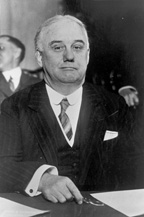William Scott Vare
| William Scott Vare | |
|---|---|
 |
|
|
United States Senator-elect from Pennsylvania |
|
|
In office March 4, 1927 – December 6, 1929 |
|
| Preceded by | George Pepper |
| Succeeded by | Joe Grundy |
| Member of the Pennsylvania Senate from the 1st district |
|
|
In office November 7, 1922 – November 30, 1923 |
|
| Preceded by | Edwin Vare |
| Succeeded by | Flora Vare |
| Member of the U.S. House of Representatives from Pennsylvania's 1st district |
|
|
In office May 24, 1912 – March 3, 1927 |
|
| Preceded by | Henry Bingham |
| Succeeded by | James Hazlett |
| Personal details | |
| Born |
December 24, 1867 Philadelphia, Pennsylvania, USA |
| Died | August 7, 1934 (aged 66) |
| Political party | Republican |
| a.^ Vare was not permitted to qualify for the seat to which he was elected in 1926, and the election results never received gubernatorial certification. He was never sworn-in, and his term was thus in dispute until he was formally unseated by the Senate. | |
William Scott Vare (December 24, 1867 – August 7, 1934) was an American construction contractor and Republican Party politician from Philadelphia, Pennsylvania. He represented Pennsylvania in the U.S. House and won a contested election to the United States Senate.
Bill Vare was the youngest of three brothers, all of whom were contractors and politicians. George (1859–1908), Edwin (1862–1922) and William were all born in the area of South Philadelphia known locally as "The Neck". It is the area of South Philadelphia that includes the Wachovia Center, Lincoln Financial Field and Citizens Bank Park.
At age six, he witnessed the death of his father, Augustus Vare, who was killed in an accident. With the exception of his two older brothers he witnessed the deaths of all his brothers and sisters. The renowned merchant of Philadelphia, John Wanamaker, took young Bill under his wing, by paying for his tuition at Philadelphia's famous Central High School. Later, he worked at Wanamaker's.
His political career began in 1884 when he observed the Mummers parade on New Years Day and realized that such marches could be employed in political campaigns. In 1890 he started construction contracting with his two older brothers. By 1909, this firm known simply as "Vare Brothers," had contracts with the City of Philadelphia whose aggregate worth was over $100,000,000.
...
Wikipedia
